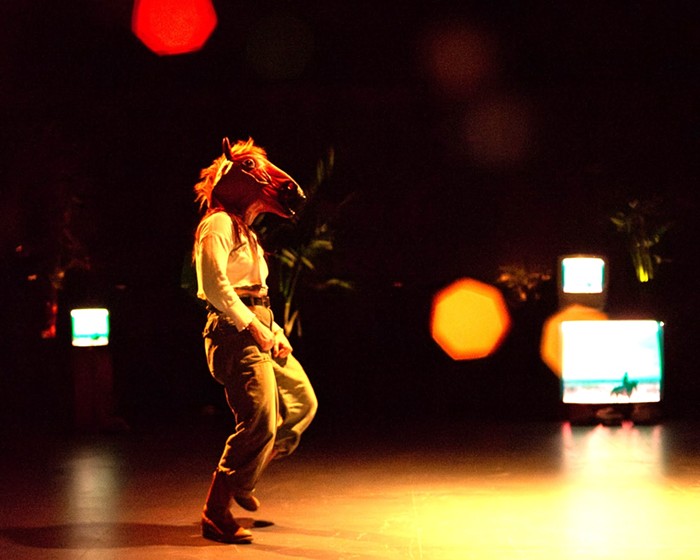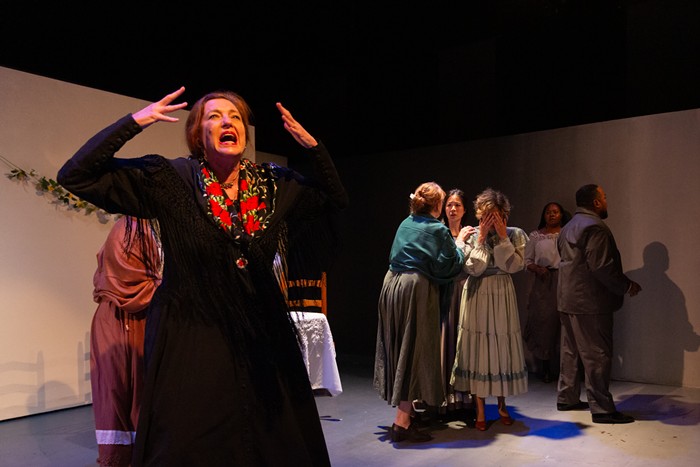
In the first act of the play Martha Bakes: A Biography of a Revolution and Insurrection that Never Happened, Martha Washington—the United State’s first first lady—reflects on her life, and laments the way history will surely overlook the sacrifices of herself and other women who helped found the country.
In the same breath, Washington also waves away the fact that her family enslaves hundreds of people, not allowing herself to fully consider the work they do or the way history will likely forget their contributions.
It’s easy to find parallels between this key tension—a white woman can see the ways she’s discriminated against, but still aligns herself with white supremacy rather than finding solidarity with enslaved Black people—and today’s social justice landscape, where movements are co-opted and white-washed by corporations. That connection is no accident, says Martha Bakes director Damaris Webb.
“Although it is part of the goal to illuminate some actual historical things that happened, there is a certain license of romanticism that lets us really make the connections to what’s happening today,” Webb says in a recent interview with the Mercury.
Webb directed a live-streamed staged table reading of Act One of Martha Bakes for the Fertile Ground Festival of New Works earlier this year. Now, she’s directing Act Two for the Vanport Mosaic, an annual memory activism and arts festival in Portland. A staged reading of the second act, which switches the focus to Ona Marie Judge, a woman enslaved by Washington, will stream at 7 pm this Friday, June 4.
Webb worked to develop the play with playwright Don Wilson Glenn. She says they were inspired to write something about women’s role in United States history when they realized that 2020 was the hundred-year anniversary of women gaining the right to vote—“and how that didn’t even include all women.” The result is Martha Bakes, which gives equal time to Washington and Judge, who was the first recorded enslaved person to runaway from her captors.
“Historically, women’s suffrage and Black civil rights and the abolitionist movement—they have so many things in common, and yet there are these external wedges that keep being pushed to divide us,” Webb adds. “Not to give anything away, but we learn in Act Two with Ona that a lot of Martha’s ways she uses to stay in her power, and be able to live with herself, generate certain stories that become the truth, even though they are not necessarily the truth.”
The full play is three acts, with the third act centering on a dialogue between Washington and Judge. Webb hopes to stage Martha Bakes in its entirety in the fall, and is aiming for a hybrid model that includes both an in-house audience and a streaming element. She also wants the play filmed to create educational materials for schools.
The 2021 Vanport Mosaic as a whole—of which Webb is a co-director—is also using a hybrid model this year, after going online-only in 2020 at the height of the COVID-19 pandemic. Some events, like Act Two of Martha Bakes, are live-streamed, while others allow live participation. Webb says that going virtual has “opened up a lot of new opportunities, but I think we also hunger for being together.”
Other highlights of the festival, which is happening now and goes through June 30, include an exhibit about the history of the Vanport community at the Pittock Mansion; a self-guided Design as Protest tour of the North Park Blocks; and a debate over defunding versus abolishing the police. Webb says one of the events she’s most looking forward to is a walking tour, happening June 5 and June 19, through Albina, Portland’s historically Black neighborhood. The tour will be led by Kent Ford, a co-founder of the Portland chapter of the Black Panther Party.
“There’s something so intimate about actually being in the same time and space,” Webb says about the tour, “and walking through the streets of Portland.”



















